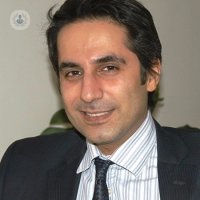What needs to be considered before bariatric surgery?
Written in association with:There are numerous different types of bariatric surgery that can help patients on their weight loss journey. In his latest article, renowned consultant bariatric and gastrointestinal surgeon Mr Majid Hashemi explains these surgeries in detail, including the different types available and what you need to consider before one of the procedures.
What are the different types of bariatric surgery?
There are essentially 4 different types of bariatric surgery:
- Laparoscopic gastric band
- Laparoscopic sleeve gastrectomy
- Laparoscopic gastric bypass
- Endoscopically-placed gastric balloon

For various reasons, the gastric band is not as common as it once was.
These days, the main bariatric surgeries performed are the sleeve gastrectomy and the gastric bypass.
Who decides which procedure is best, the patient or the surgeon?
Ultimately, it will always be the patient who decides on the surgery. The doctor’s role is to give you the guidance and support needed to make the right decision.
The doctor can offer their expertise and tell the patient which procedure they believe is best for them, based on the patient’s own personal history. However, I want the whole process to be patient-driven, as that tends to give better results. Patients are much more motivated to lose weight if this is the case.
What factors need to be considered in the decision?
The most important factors are the detailed history and examination of the patient. A detailed history can give the doctor a great amount of information, and it is this history that will allow the doctor to guide the patient and give them the best advice.
For example, we know that patients with diabetes will do better with certain operations. Some operations may also exacerbate acid reflux symptoms in patients. Taking a full history of the patient allows us to warn them about this. A bypass is usually recommended for patients who already suffer from acid reflux.
Another risk factor is age. For very elderly patients, the lowest-risk procedure is recommended. A balance needs to be made between the risks and benefits.

What questions should you ask your doctor prior to your first consultation if you are undecided?
Patients must be clear about their expectations and what they hope to get from the surgery. The whole range of options needs to be discussed. For example, balloons are removed after a year, and for many patients, this isn’t a problem. They do not want a full laparoscopic operation with incisions.
Recovery time is also key. You should ask your doctor when you’ll be able to eat again, when you’ll be able to drink again, and to go out and socialise with friends and family with minimal symptoms.
It’s also perfectly all right to ask the doctor about their experience and the results they have had.
How can you, in general, prepare for bariatric surgery?
It is essential to get as many things in place as possible. It’s nice to take a couple of weeks off after the surgery to focus on your eating and lifestyle. I ask my patients to clean out their cupboards and get rid of any unhealthy foods.
We put all of our patients on a liver shrinkage diet. This makes access to the essential areas easier during the surgery. We also want patients to maintain hydration. In addition to this, we use a special programme tailored to patients with cardiac or respiratory problems.
Mr Majid Hashemi is a leading consultant bariatric surgeon with over 35 years of experience. If you would like to book a consultation with Mr Hashemi, you can do so today via his Top Doctors profile.


